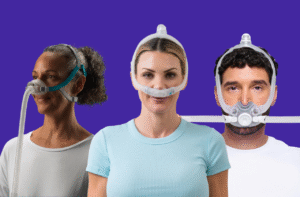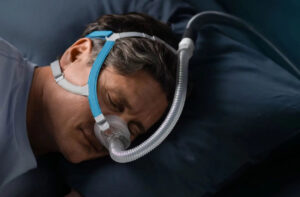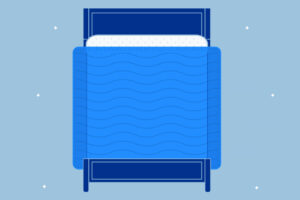Sleep College for Grownups? Why Adults Need To Relearn How To Relaxation
Many adults admit they by no means actually discovered methods to sleep effectively, and now they’re feeling the implications. In at present’s always-on tradition, from fixed display screen time to nonstop duties, getting a superb evening’s relaxation has develop into a severe problem.
To discover this contemporary sleep disaster, we surveyed 1,000 People about their struggles with relaxation and whether or not they can be keen to attend a “sleep college” designed to assist. What we discovered reveals simply how keen individuals are for professional assist, and the way deeply sleep struggles have an effect on day by day life.
Key Takeaways
- 1 in 3 People are embarrassed about how they sleep.
- 1 in 7 People have spent $200 or extra on sleep enchancment.
- Greater than 1 in 10 People (11%) have turned to Google and ChatGPT for assist falling asleep.
- Over 2 in 5 People (41%) have turned to the web or AI for assist falling asleep.
- 2 in 5 People (44%) have missed work, college, or an occasion due to poor sleep.
- 1 in 3 People (33%) are taken with attending a “sleep college,” and three% have already finished so.
- Over 4 in 5 People (84%) suppose sleep programs must be coated by medical insurance.
- Practically 4 in 5 People (78%) suppose colleges ought to train sleep as a part of well being training.
Why People Are Prepared To Enroll in Sleep College
Throughout the nation, many adults are open to the thought of going again to highschool. It’s not for a level, however to learn to sleep higher. Curiosity in a structured, expert-led sleep course is rising, particularly amongst sure generations feeling the toll of poor relaxation.
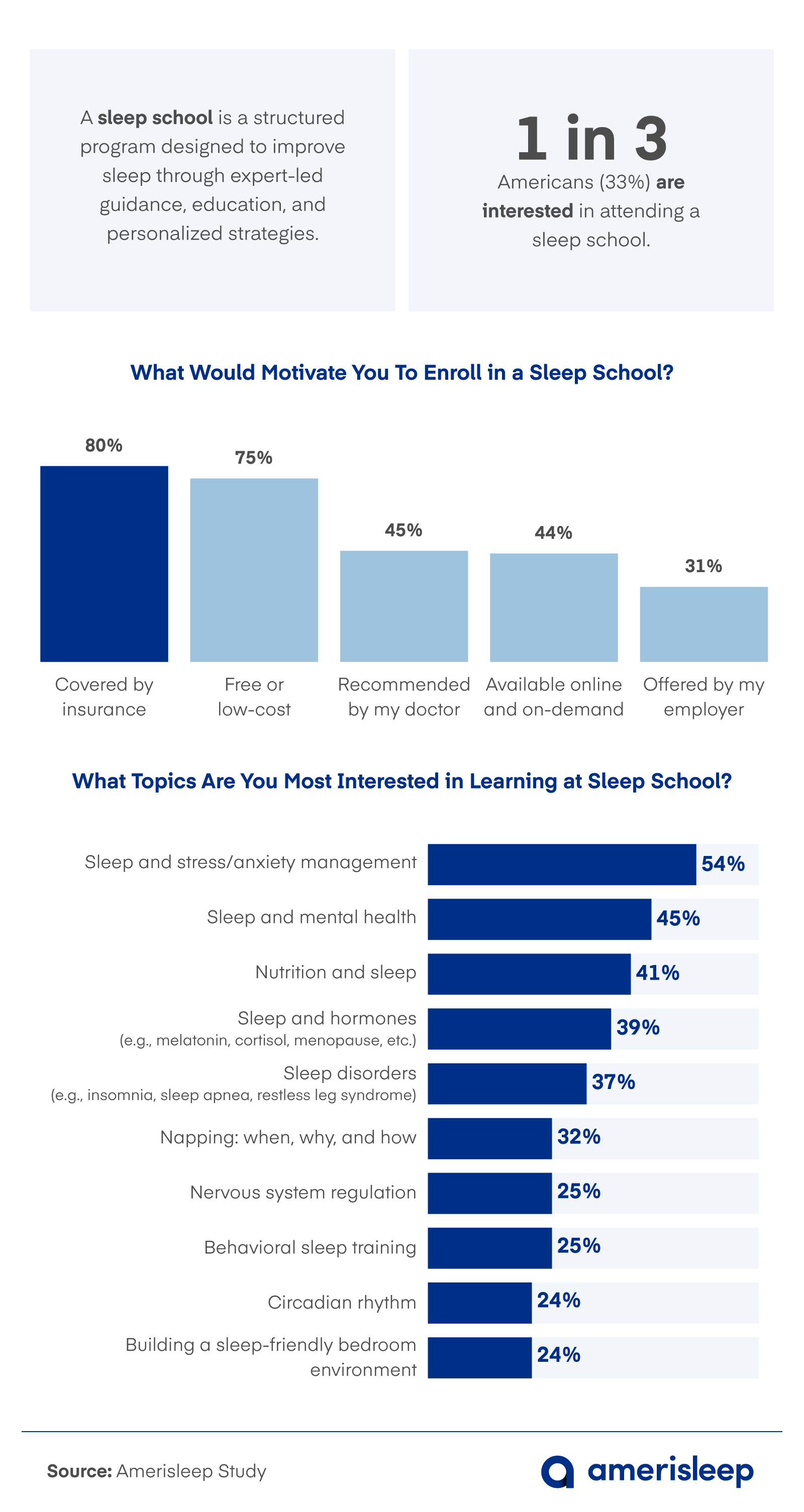

One in three People expressed curiosity in attending a “sleep college,” and a smaller group, 3%, have already finished so. Gen X and millennials confirmed the strongest enthusiasm, with 36% from every group , adopted by 30% of Gen Z and solely 16% of child boomers.
On common, People stated they might be keen to pay $65 for such a course. Gen Xers have been essentially the most keen to take a position, at $80, adopted by millennials at $65, Gen Z at $55, and boomers at $40. However almost 4 in 5 People (78%) stated colleges ought to train sleep as a part of well being training.
What would inspire individuals to enroll? Most respondents (84%) stated medical insurance ought to cowl sleep programs, and greater than 80% stated they might be extra prone to attend if that have been the case.
One other 75% would join if sleep college have been free or low-cost. Physician suggestions and the comfort of on-line, on-demand entry have been additionally high motivators.
As for what they hope to be taught, adults crave sensible and customized steerage. The most well-liked matters of curiosity amongst our respondents included managing stress and nervousness (54%), understanding how sleep impacts psychological well being (45%), and utilizing diet to enhance sleep (41%).
Different high-interest topics have been how hormones work together with sleep (39%) and customary issues like sleep apnea and stressed leg syndrome (34%).
Preferences additionally different by technology. Gen Z was particularly targeted on psychological well being, rating it alongside stress administration as high considerations (each at 56%).
Millennials echoed these priorities, whereas Gen X expressed sturdy curiosity in hormone-related points (45%) and stress (58%). Child boomers have been most taken with sleep issues and diet.
Why Individuals Are Struggling With Sleep
Many People don’t simply wish to sleep higher, they wish to really feel assured and safe of their relaxation. For some, that might imply overcoming emotions of disgrace or embarrassment about how effectively they sleep, and even the stress to faux they’re sleeping higher than they’re.
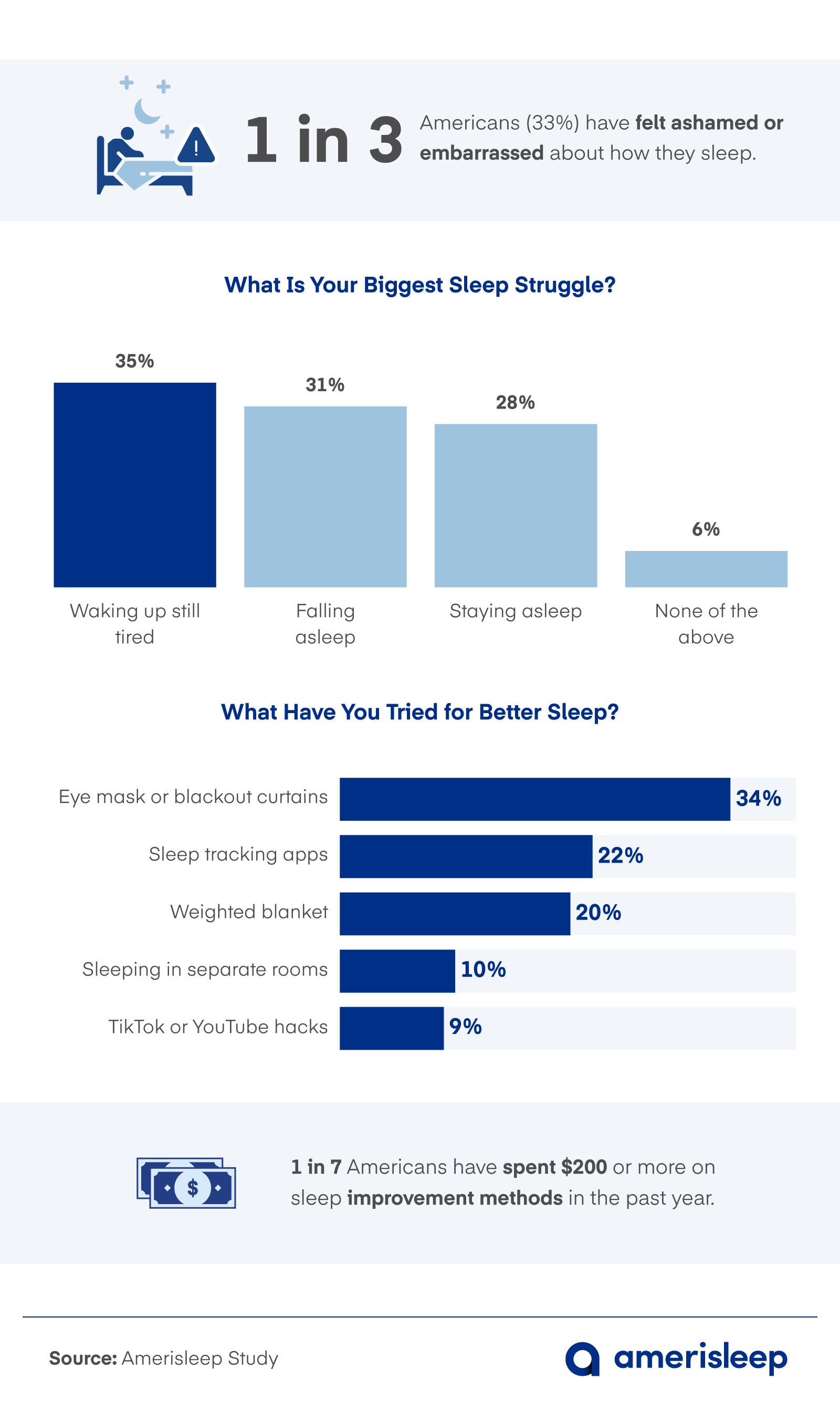

One in three People have felt embarrassed about how they sleep, with Gen Z main the way in which at 39%, adopted by millennials (35%), Gen X (29%), and child boomers (23%).
Practically half of Gen Zers admitted to mendacity about their sleep habits, typically to companions, associates, and even their very own medical doctors. One other 1 in 20 Gen Zers admitted to mendacity about their sleep to their boss or coworkers.
Waking up drained was the commonest sleep grievance (35%), adopted by hassle falling asleep (31%) and staying asleep (28%). Individuals have tried a variety of methods to enhance relaxation — the commonest being eye marks or blackout curtains (34%), sleep monitoring apps (22%), and weighted blankets (20%).
The battle runs deep. Two in 5 People stated they’ve missed work, college, or an necessary occasion due to poor sleep. Once they can not sleep, 41% flip to the web or AI for assist, together with Google, ChatGPT, or each. In actual fact, 11% reported utilizing each instruments, and three% stated they consulted ChatGPT alone.
On common, People have spent $50 up to now yr on sleep merchandise, dietary supplements, or companies. However some (1 in 7) have spent $200 or extra on sleep enchancment.
For extra views we’ve curated on AI and sleep, try our Dreaming of AI survey outcomes.
FAQs
Can I profit from hiring a sleep coach?
A sleep coach may be priceless should you’re combating persistent sleep points that haven’t improved with primary sleep hygiene adjustments, or should you want customized steerage and accountability to determine higher sleep habits.
They can assist establish particular behavioral patterns disrupting your sleep, create personalized routines, and supply ongoing assist as you implement adjustments.
Nevertheless, it’s necessary to differentiate between sleep coaches (who concentrate on behavioral methods) and medical sleep specialists. When you have signs of sleep issues like sleep apnea, stressed leg syndrome, or persistent insomnia, you need to seek the advice of a physician or sleep medication specialist first.
How can I separate good sleep recommendation from unhealthy?
Good sleep recommendation is usually evidence-based, comes from credible sources like sleep medication professionals or peer-reviewed analysis, and focuses on gradual, sustainable adjustments somewhat than fast fixes or excessive measures.
Be cautious of recommendation that guarantees miraculous outcomes, promotes costly dietary supplements or devices as cure-alls, or contradicts well-established sleep science ideas just like the significance of constant sleep schedules and darkish, cool sleeping environments.
When evaluating sleep recommendation, search for suggestions that acknowledge particular person variations and recommend consulting healthcare suppliers for persistent issues, somewhat than one-size-fits-all options.
Is it fallacious to belief an AI for sleep recommendation?
Whereas AI can present useful normal details about sleep hygiene and evidence-based sleep practices, it shouldn’t be your solely supply for sleep steerage, particularly when you have ongoing sleep issues.
AI techniques could make errors, might not have entry to essentially the most present analysis, and can’t assess your particular person medical historical past or carry out the sort of customized analysis {that a} healthcare supplier can supply.
It’s greatest to make use of AI-generated sleep recommendation as a place to begin for understanding normal ideas, however all the time confirm necessary info with healthcare professionals and contemplate AI options as complementary to, not a alternative for, correct medical session when coping with persistent sleep points.
When do sleep troubles want medical intervention?
It is best to search medical intervention should you persistently have hassle falling asleep or staying asleep for greater than three weeks, regardless of practising good sleep hygiene, as this will point out persistent insomnia or an underlying sleep problem.
Warning indicators that require instant medical consideration embody loud loud night breathing with respiration pauses (doable sleep apnea), extreme daytime sleepiness that interferes with day by day actions, or uncommon behaviors throughout sleep like sleepwalking or violent actions.
And if sleep issues are considerably impacting your work efficiency, relationships, psychological well being, or should you’re experiencing signs like morning complications, problem concentrating, or temper adjustments, it’s time to seek the advice of a healthcare supplier who can correctly diagnose and deal with potential sleep issues.
How do I do know if I’m getting sufficient sleep at evening?
Essentially the most dependable indicator of enough sleep is how you’re feeling throughout the day. In the event you get up feeling refreshed and may preserve alertness and power all through the day with out extreme caffeine or naps, you’re possible getting adequate sleep.
Most adults want 7-9 hours of sleep per evening, however particular person wants range, so take note of whether or not you’re falling asleep inside 15-20 minutes of mendacity down and sleeping by way of many of the evening with out frequent awakenings.
Different optimistic indicators embody secure temper, good focus, the flexibility to operate effectively throughout your regular day by day actions, and never feeling an awesome urge to sleep throughout inappropriate occasions like whereas driving or in conferences.
How can expertise assist and harm my sleep?
Know-how can considerably assist your sleep by way of instruments like sleep targeted apps that monitor your sleep patterns and show you how to establish traits, white noise machines or apps that create constant ambient sounds, and sensible thermostats that preserve optimum bed room temperature all through the evening.
Sleep-focused apps can information you thru leisure strategies or respiration workout routines earlier than mattress, whereas blue mild filtering software program and amber-tinted glasses can cut back the sleep-disrupting results of screens within the night.
Nevertheless, expertise may severely hurt your sleep high quality by exposing you to stimulating blue mild from telephones, tablets, and computer systems, which suppresses melatonin manufacturing and delays your pure sleep onset, particularly when used inside an hour of bedtime.
The fixed notifications, participating content material, and psychological stimulation from social media, streaming companies, or work emails can preserve your thoughts energetic when it must be winding down, making it a lot more durable to go to sleep and obtain deep, restorative sleep cycles.
Studying To Relaxation One Lesson at a Time
In a society that rewards hustle over well being, it’s no surprise so many adults are wanting to relearn sleep. This rising curiosity in structured relaxation training, from programs to AI instruments, reveals a need to repair what’s damaged in our routines. People are able to take sleep severely, one lesson at a time.
Methodology
We surveyed 1,000 People to research America’s fashionable sleep disaster by uncovering what number of adults are failing at relaxation and revealing the shocking demand for a structured “sleep college” to repair it.
The common age was 40; 50% have been feminine and 50% have been male. Generationally, 8% have been child boomers, 23% have been Gen X, 55% have been millennials, and 13% have been Gen Z. Any percentages that don’t whole 100 are attributable to rounding.
About Amerisleep
Amerisleep is a pacesetter in sleep innovation, providing eco-friendly, high-performance mattresses designed to enhance relaxation and well-being. From superior reminiscence foam to focused assist zones, Amerisleep’s merchandise are constructed that can assist you get the deep, restorative sleep your physique wants.
Honest Use Assertion
If you want to share our findings, you’re welcome to take action for noncommercial functions. Simply make sure you embody a hyperlink again to this web page and credit score Amerisleep because the supply.

